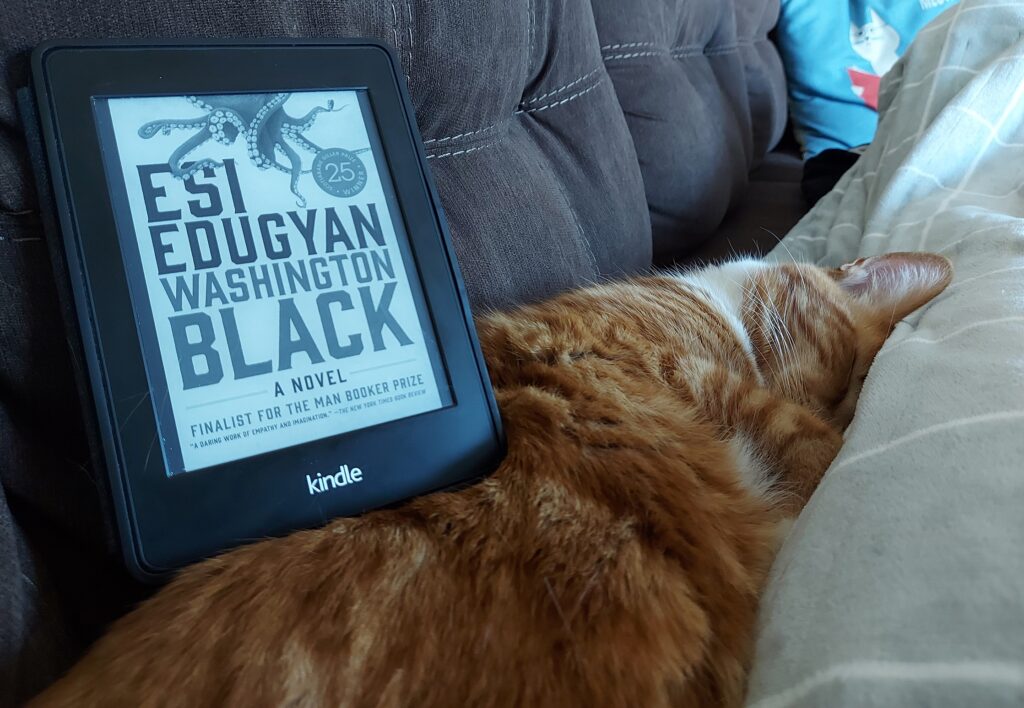Washington Black by Esi Edugyan

Washington Black reads like a Dickensian novel with its intriguing and varied cast of characters and the unexpected adventures that the protagonist finds himself undertaking. The protagonist’s narration is as educated and articulate as that of David Copperfield’s. The difference between Esi Edugyan’s novel and anything written by Dickens is that the protagonist in Washington Black is a young Black man who was born a slave and who cannot escape racism even when he is freed from slavery. I found Washington Black to be an engaging and enjoyable read, despite its dark subject matter, until the very abrupt and completely unsatisfying ending.
Washington Black is set in the 1830s and opens in Barbados. George Washington Black, known as Wash, is an eleven-year-old slave on Faith Plantation. The master at Faith Plantation has died and his nephew has just arrived to take over. Erasmus Wilde is the epitome of the cruel, racist white master. Wash is a field slave who is being raised by another slave known as Big Kit. One day, Wash and Big Kit are summoned to serve dinner at the big house. There Wash is introduced to Erasmus’ brother, Christopher Wilde, known as Titch, who is a scientist. Wash is loaned to Titch to work as his manservant, assisting Titch in his scientific endeavors, which mainly consists of his “cloud-cutter” (i.e. hot air balloon) that he plans on launching from the top of the mountain on the plantation.
Titch is an abolitionist who abhors the way his brother treats the slaves on the plantation. He takes Wash under his wing and teaches him to read. He realizes that Wash is an amazingly gifted artist and encourages his drawing. Under Titch’s tutelage, Wash learns that there is a white man that he does not need to fear, and he begins to believe that Titch is treating him as Titch’s equal.
Wash’s “idyllic” life with Titch is interrupted by the arrival of Erasmus and Titch’s cousin, Philip, a melancholy man, who comes bearing the news that their father is dead. For reasons I cannot fathom, except that because he is a stupid, selfish bastard, Philip commits suicide in front of Wash. This puts Wash’s life in danger as he will be blamed for Philip’s death. Titch and Wash escape from Barbados in Titch’s cloud-cutter only to crash land on a ship sailing for America. Then Titch learns that his father may still be alive, so he and Wash head to the Artic to see if they can find him.
Titch is the white man who insists he is not racist but does not realize he is plagued by the subconscious racial bias. Titch disapproves of slavery but has no issue with using slaves to assist with his science experiments. He does not take Wash under his wing for purely altruistic reasons, but because Wash is of use to him. He encourages Wash’s artistic talent, but he is surprised that someone like Wash is even capable of such artistry in the first place. He helps Wash escape from Barbados not just to save Wash’s life, but also because he does not to be trapped there himself having to run Faith Plantation when Erasmus goes back to England to deal with their father’s estate. Wash comes to depend on Titch for survival, but Titch eventually abandons Wash in the Arctic tundra, disappearing into a snowstorm after a disappointing conversation with his father.
Wash, on his part, loves Titch and looks up to him as a father figure. You can tell by Wash’s narration (he is narrating his story from some future point when he is a young man) how much he emulates Titch, an educated, upper class white man, and he even follows in Titch’s footsteps as a scientist. After Titch disappears and is presumed dead, Wash spends the next few years mourning the loss of Titch and wondering why Titch would abandon him after treating him like a son. Wash struggles with the idea that Titch did not really think of him as his equal and was only using him. This informs the decisions he makes and the relationships he develops in his travels to Nova Scotia (which, very interestingly, had a large community of free Black people) then to England (which abolished slavery but not racism, so Wash will never be fully accepted there), as well as the guilt he feels for forgetting about Big Kit so he can be a white man’s sidekick.
Wash’s journey through the novel mirrors that of Titch: looking for the truth but ending up disappointed with the answers that he finds. But that seems to be the point of Washington Black: There is no satisfying explanation for slavery. There cannot be. Just as there is no satisfying explanation for why a Black person still lives with racism today almost 200 years after the English abolished slavery and over 150 years after slavery was abolished in the US. Wash is an admirable character and his story does not have the ending that he deserves, but I still think this novel is worth reading.